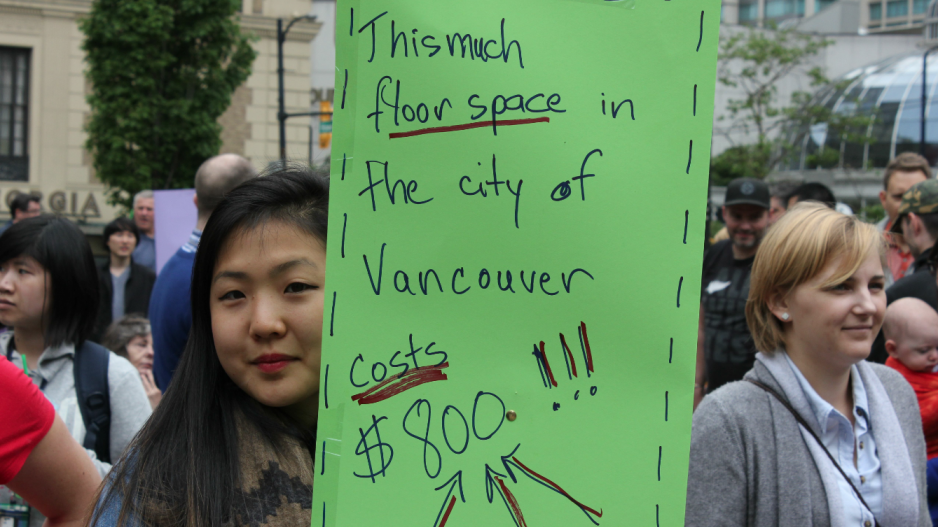The level of concern around housing, homelessness and poverty in British Columbia reached an “extraordinarily high level” in advance of the BC NDP’s first full budget, according to Insights West.
Half of B.C. residents called it the most important issue in the province, and the NDP responded by making housing and affordability a key pillar of its three-year fiscal plan. The expectations were high, and the reaction is loud. (Read more about Budget 2018’s housing policies here.)
The Greater Vancouver Board of Trade (GVBOT) gave government’s housing affordability strategy a B+ in its budget report card, tying fiscal prudence for top marks.
The organization applauded the measures as “a needed first step”, while noting it will continue to call on the province to encourage municipal governments to “expedite application, approval and permitting processes.”
Jock Finlayson, chief policy officer at the Business Council of British Columbia, called the $500 million of revenue to be generated from new housing tax announcements “significant,” noting the funds will likely go toward housing affordability initiatives, and toward general government programs.
The BC Real Estate Associate (BCREA) called on government to introduce transitional rules for all real estate transactions that will be affected by new tax measures.
The foreign buyer’s tax increase and expansion, and the property transfer tax increase to 5% on $3-million-dollar-plus residential properties, both take effect tomorrow, February 21. In a release, the BCREA referenced the collapsed deals and frustration experienced by real estate agents when the BC Liberals suddenly introduced the 15% foreign buyer’s tax in 2016. The association applauded the budget’s supply-side measures, while pointing to a missed opportunity to increase property transfer tax thresholds.
University of British Columbia economist Tom Davidoff shared that overall, the policies had him “very happy.”
“For years, most economists myself included have believed we have low property taxes and high income and sales taxes in B.C., and the message that sends the world is: come here to buy real estate but don’t make a living here,” he said.
“I think this will at the top and the middle of the market have impact. Whether this stuff applies to the bottom of the market which has really been thriving, I don’t know, but at minimum, it should raise some significant revenue for the province, and that of course can be used to help people struggling.”
Davidoff added that collecting and sharing data on condominium pre-sales will ultimately benefit consumers as well as the broader housing market. He noted he opposes the foreign buyer’s tax increase – and the tax generally – for ethical reasons.
“I just don’t think targeting people’s nationality is necessary,” he said. “Since the foreign buyer tax came in nothing really that positive has happened in terms of overall affordability.”
Anne McMullin, president of the Urban Development Institute Pacific, expressed concern about the level of proposed taxation tied to housing.
“It’s an absolutely massive tax increase on homebuyers, on people who are investing in the housing sector,” she said. “And at the same time, they have earmarked $6 billion to be invested in housing, yet with no incentives for anything to compel municipalities to deal with the approvals. So they’re taking an enormous amount of money out of the industry yet saying that they’re going to put the money in."
“Unless we can deal with the approvals, we’re six, seven years away from having any relief in sight.”
Economic forecasts within the provincial budget expect to see housing starts decline by nearly 27% in 2018. McMullin points to a bottleneck effect at the municipal level, and how she sees nothing in the budget to address the challenges developers have in bringing supply to local markets.
“If the provincial government is wanting to build 114,000 units over 10 years well they’re going to have the exact same problems that we have unless they come up with incentives or ways to compel municipalities and partnerships to, as we say, land the density, get the stock built,” she said, adding that UDI Pacific would like to have seen a provincial-municipal agreement in place with firm timelines tied to housing investments.
A Surrey Board of Trade (SBOT) release noted the organization was “pleased” the provincial government will generally be encouraging municipalities to expedite affordable housing development, and that B.C. will match the increase to available property tax exemptions provided under municipal revitalization agreements for purpose-built rental housing.
“Surrey is not known for providing incentives for affordable housing, hopefully, this will be enough to bring Surrey to the table,” said Huberman. “This is all a good start."
David Hutniak, CEO of LandlordBC, also weighed in in the release: “The government’s focus on affordable rental housing is laudable. The commitment to work with the private sector rental developers is key and we are pleased to see property tax considerations and pre-zoning for new rental housing on the table. In addition, the new HousingHub represents an opportunity for the community housing sector and private sector to partner to develop new affordable purpose-build rental housing for British Columbians."
While the new government funding commitments and taxation measures focus on the residential housing market almost in their entirety, Stefan Morissette, vice-president of industrial at Colliers International, said they could have broader market implications.
“If anything this may shift foreign interest from the residential side to the commercial side,” said Morissette. “Because if I’m an Asian investor looking to bring a bunch of money over, I might start looking at industrial, warehousing or office buildings instead of residential.”




